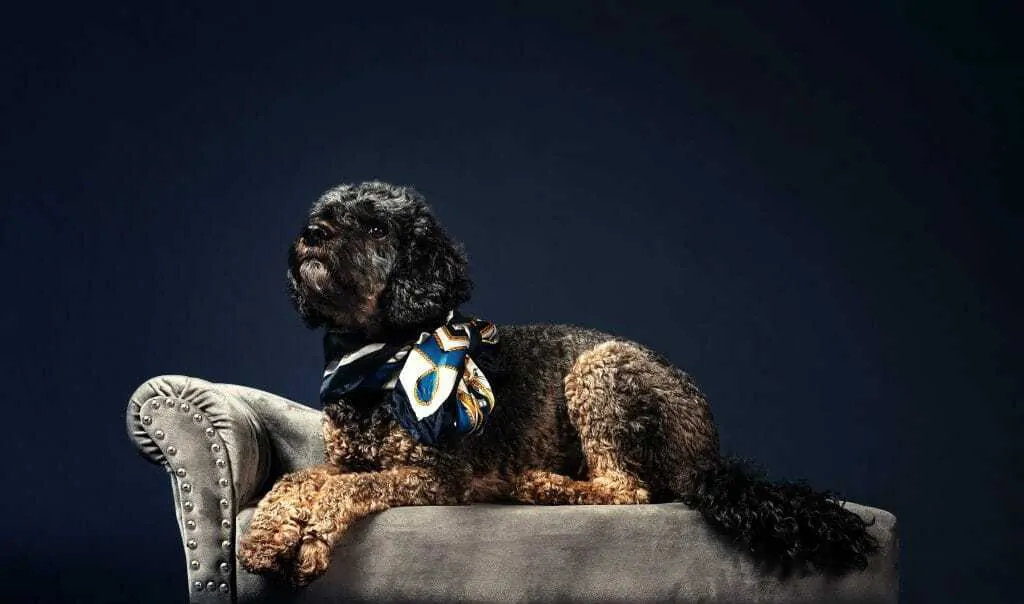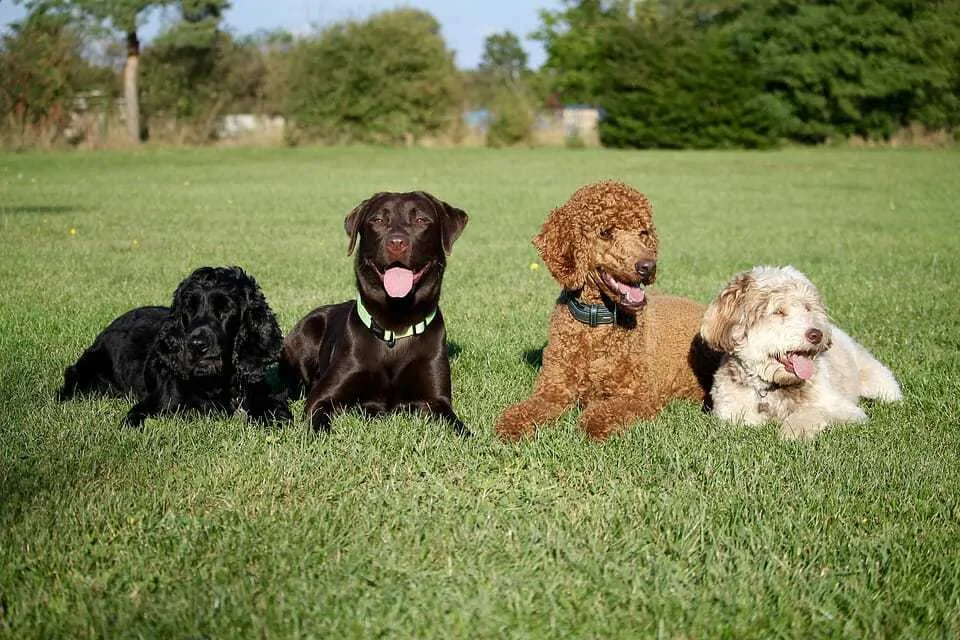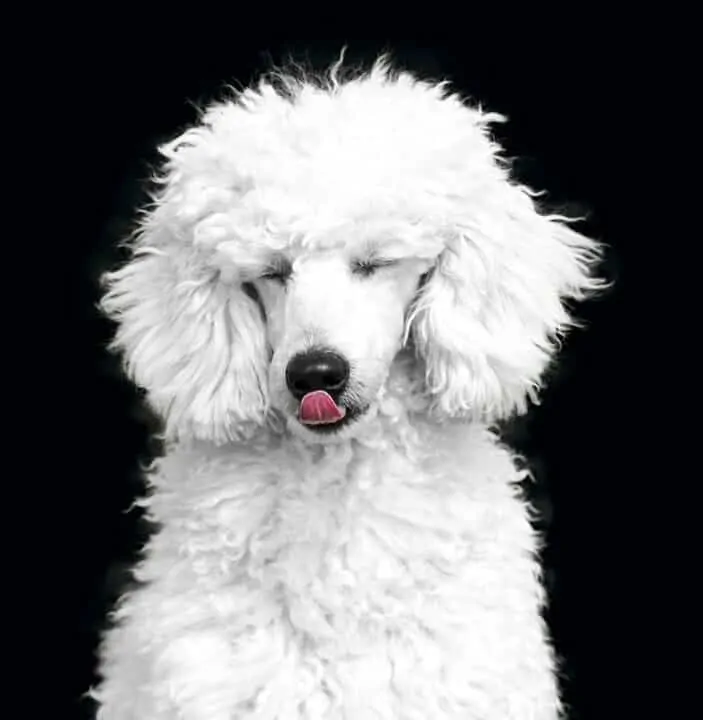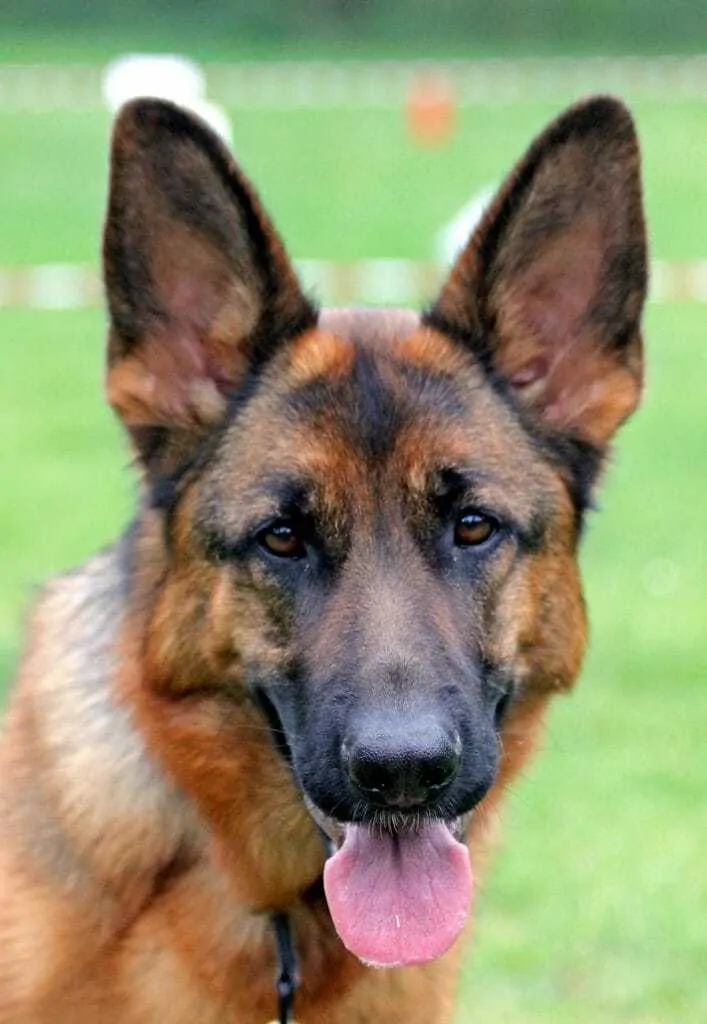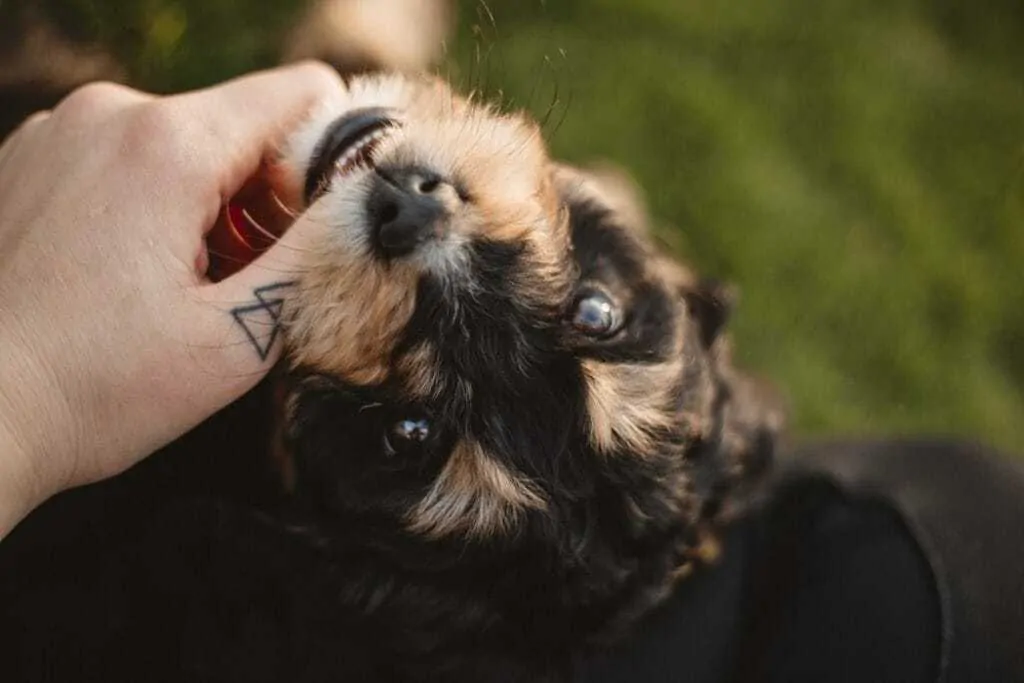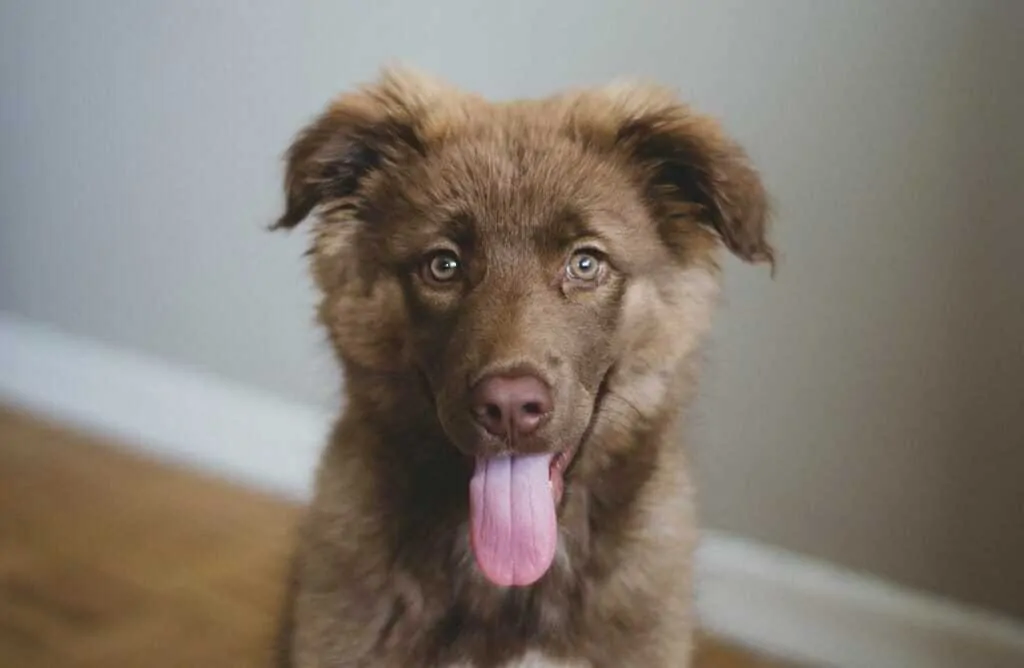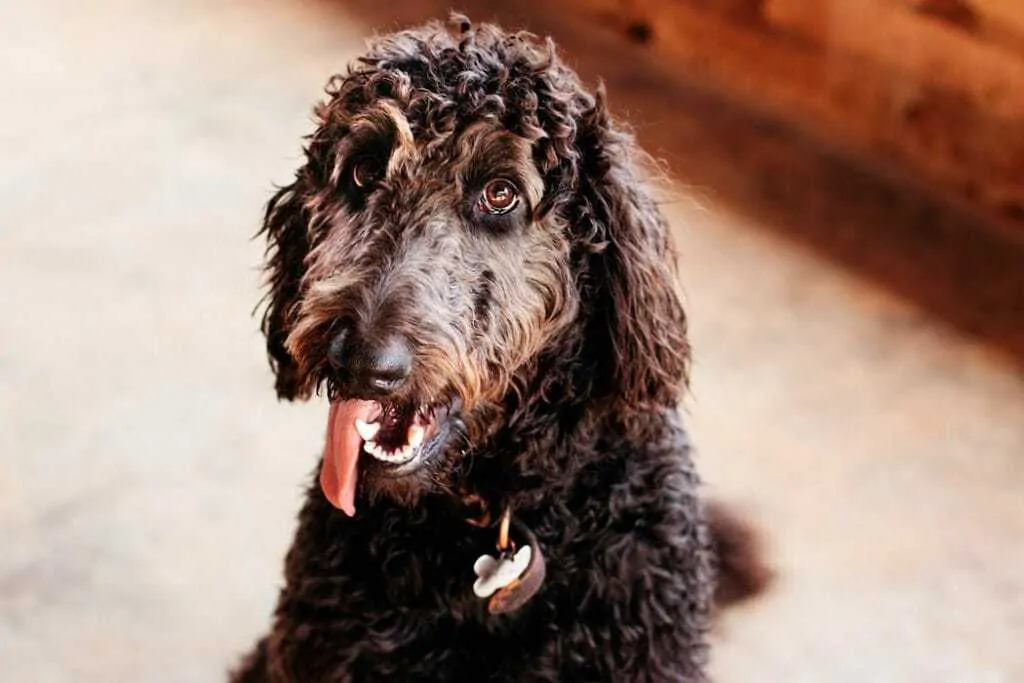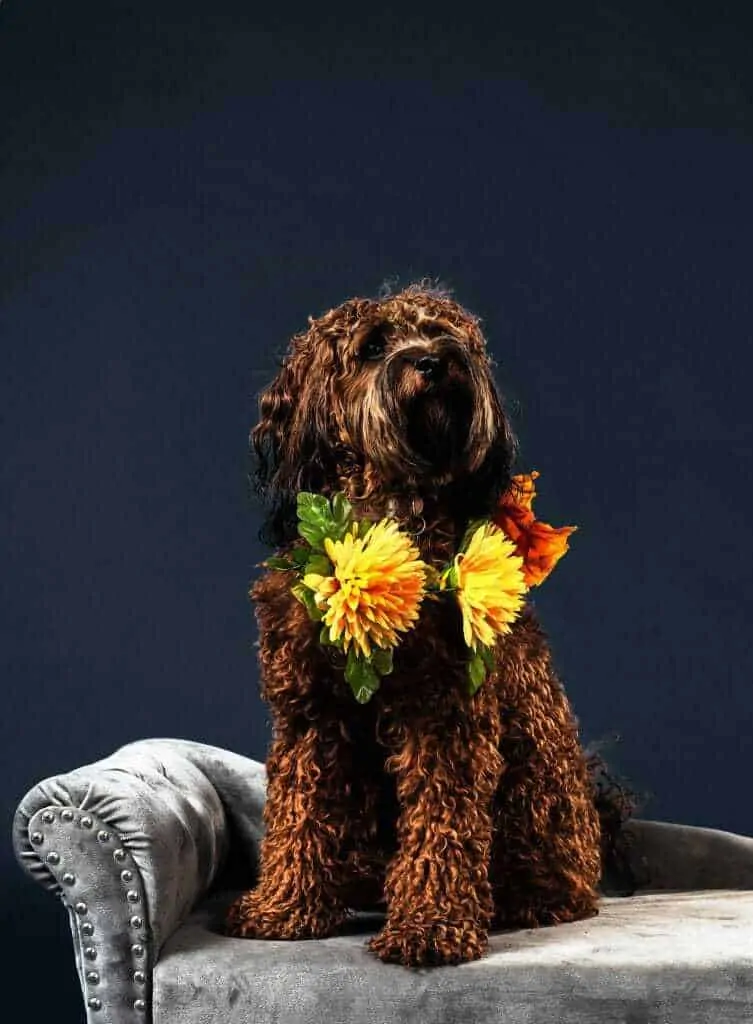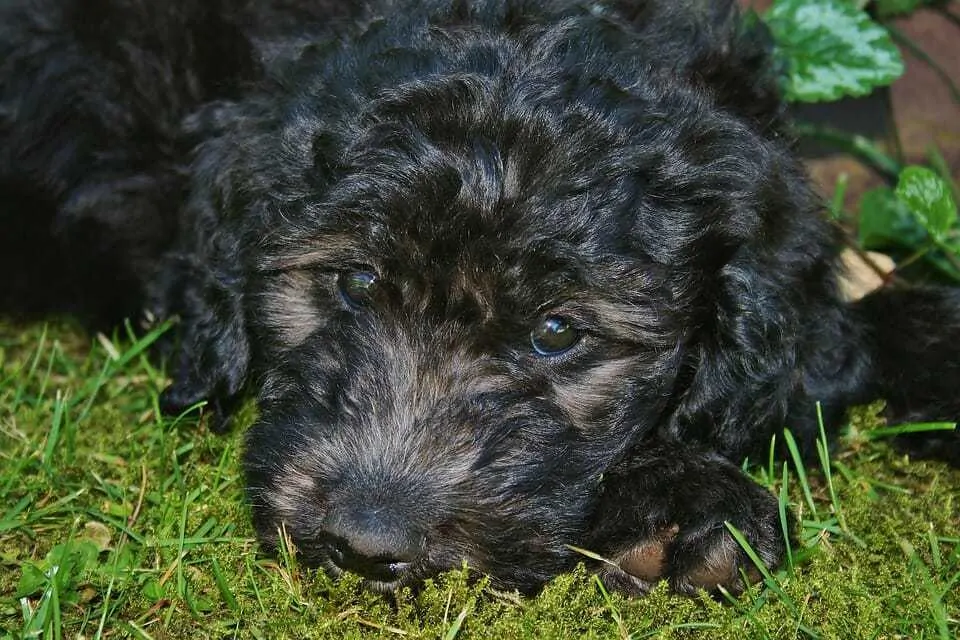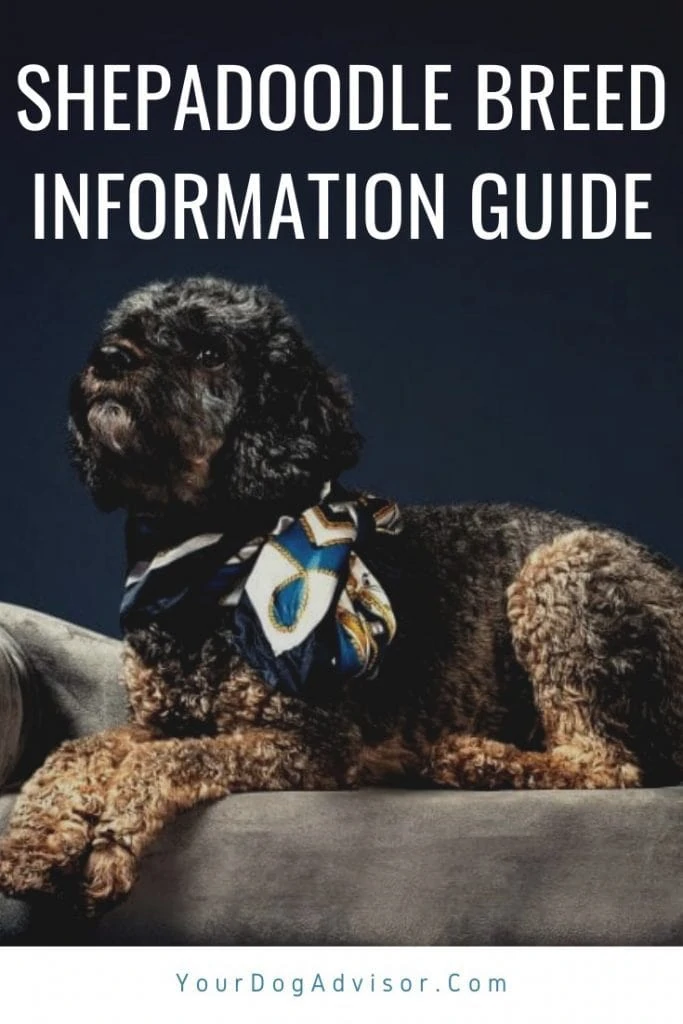Most of us have heard about the Labradoodle, the Goldendoodle, and a number of doodle mixes in between, but a more low-key, more unique hybrid is rising in popularity and has a lot of people curious.
That’s right, we’re talking about the Shepadoodle!
This designer dog is a mix of intelligence, beauty, work-ethic, and energy, so it’s no wonder dog lovers everywhere are intrigued by this designer dog.
But what exactly is a Shepadoodle, and does he have the potential to rise to fame the way many of his doodle counterparts have?
Let’s find out!
Contents
What Is A Shepadoodle?
The Shepadoodle is a mix between the Standard Poodle and the German Shepherd.
Have you ever heard of a designer dog, a hybrid dog, or a crossbreed dog? Chances are you have. In fact, the Labradoodle, who is one of the world’s most popular “breeds” right now is actually not a breed at all. It’s a crossbreed. And so is the Shepadoodle.
A mix between the Standard Poodle and the German Shepherd, the Shepadoodle was “designed” for lack of a better word, to combine the best of both worlds when it comes to the Poodle and the German Shepherd.
So, what does this mean for a potential Shepadoodle owner?
Well, for starters, it means that your Shepadoodle is going to be different from a purebred in that you won’t be able to predict a number of aspects and traits about him as accurately as you would if he was a purebred.
But that’s just the beginning.
Let’s learn more about the world of crossbreeding and the controversy that goes along with it.
What You Should Know About Crossbreeds And The Controversy Surrounding Them
Although crossbreeding has been around for centuries, it is considered a controversial practice.
A number of professionals, experts, and dog enthusiasts alike have opinions on the ethics and safety of crossbreeding, and not everyone sees eye to eye.
But what exactly is crossbreeding, and how is a crossbreed any different from a mutt? Great question!
This is one of the many debates surrounding the topic of crossbreeding, with some enthusiasts insisting that crossbreeds are no different from mutts at all.
Others insist, however, that crossbreeds are in fact different from mutts due to their specifically chosen parent breeds.
Have you ever heard the term “designer dog”? If so, then you’ve heard of a crossbreed. Also known as a hybrid or mixed breed, a crossbreed is considered by many to be unique to mutts due to the fact that they have been purposely bred to carry the characteristics of two purebred parent breeds.
Mutts, on the other hand, were not bred specifically for certain traits and may have a number of different breeds in their bloodline.
So, what’s the big deal with a crossbreed?
Many argue that crossbreeds are sold with the illusion that they carry “the best of” both parent breeds, when the truth is you could get any number of unpredictable results with a crossbreed litter, especially if they are a first generation hybrid litter.
The Shepadoodle, for example, may be hypoallergenic, like his Poodle parent, or he could be double coated and shed heavily, like his German Shepherd parent. Or, he could have a coat that is somewhere in between the two.
The same unpredictability goes for the Shepadoodle’s temperament, health, activity level, and so on.
Should this deter you from considering opening your home to a crossbreed? It’s hard to say. Many intelligent and well-educated canine experts ride the fence on both sides when it comes to crossbreeding, and there has yet to be definitive proof that hybrids are healthier than purebreds.
So, the choice to raise a crossbreed is really a personal one.
What most experts and dog trainers can agree on and do stress is that any dog, regardless of his breed, crossbreed, or mix, should be properly trained, socialized, and given plenty of exercise consistently throughout his life to stay happy, well rounded, and healthy.
Now, with that being said, let’s dive right in and get to know the Shepadoodle a little better. But how do you get to know a crossbreed like the Shepadoodle? By getting to know his purebred parent breeds, of course!
Let’s start with the Poodle!
Meet The Standard Poodle
The Standard Poodle is both brainy and beautiful!
Temperament – Intelligent, Athletic, Funny, Proud
Weight – 40 – 70 Pounds
Lifespan – 10 – 18 Years
Health Concerns – Hip dysplasia, eye disorders, idiopathic epilepsy, von Willebrand’s disease, sebaceous adenitis, and bloat.
Hypoallergenic – Yes
Coat Coloring – Black, white, blue, black & white, silver, grey, apricot, cream, sable, brown, and red.
More About the Standard Poodle
Often mistaken for a product of France, the fancy “French” Poodle actually originates from Germany, where he was a renowned water dog.
Poodles were bred retriever dogs and spent most of their early days diving off of boats and docks to retrieve ducks and fish for their masters.
In fact, the Poodle’s flamboyant haircut was designed more out of necessity to keep the Poodle warm in the freezing waters than out of fashion.
However, upon arriving in France the intelligent and beautiful Poodle soon found himself to be somewhat of a fashion statement amongst nobles.
The Poodle is a renaissance dog of sorts, taking on many jobs throughout history including water retrieving, circus performances, street shows, and truffle hunting.
Today, Poodles make wonderful companions to active households and dog parents who understand the importance of mental and physical stimulation.
Intelligent dogs like Poodles can be prone to separation anxiety, boredom, and destructive behaviors if they are not properly exercised, trained, and mentally stimulated regularly.
Poodles get along well with children and other household pets, although they have a very high prey drive and are not recommended to be in homes with smaller pets like rodents or birds.
Meet The German Shepherd
The German Shepherd is famous for being a military hero, but he began as a humble herding dog in Germany.
Temperament – Courageous, Intelligent, Confident, Hard-Working
Weight – 50 – 90 Pounds
Lifespan – 7 – 10 Years
Health Concerns – Hip dysplasia, elbow dysplasia, myelopathy, and bloat.
Hypoallergenic – No
Coat Coloring – Black, Sable, Black & Tan, Red & Black, Black & Silver, and Grey
More About the German Shepherd
The modern-day German Shepherd may be regarded as a military and police hero from coast to coast, but in his humble beginnings the German Shepherd got his start as a herding dog in the hills of Germany.
This intelligent, athletic, and work-minded breed thrives on using his brain and putting all that brain power to use.
And while he sits as the American Kennel Clubs second most popular dog breed, he is not the recommended dog for first time dog owners or prospective dog owners who are very busy.
German Shepherds require lots of training, socalizion, and exercise to stay mentally and physically happy.
They are working breeds at heart and need to stay consistently mentally stimulated. With that being said, when properly cared for, there is no more loyal companion you’ll have than a German Shepherd.
German Shepherd dogs also do great with children and other household pets when properly socialized and are loyal to their family members. A bonus? They make excellent guard dogs.
Meet The Shepadoodle
The Shepadoodle is a mix between two very intelligent and athletic breeds.
Possible Temperament – Intelligent, Athletic, Funny, Proud, Courageous, Confident, Hard-Working
Possible Weight – 40 – 90 Pounds
Possible Lifespan – 7 – 18 Years
Possible Health Concerns – Hip dysplasia, eye disorders, idiopathic epilepsy, von Willebrand’s disease, sebaceous adenitis, myelopathy, and bloat.
Hypoallergenic – It depends on genetics
Possible Coat Coloring – Black & Tan, Red & Black, Black & Silver, Black, White, Blue, Black & White, Silver, Grey, Apricot, Cream, Sable, Brown, and Red.
More About the Shepadoodle
There is no denying that the Shepadoodle comes from great stock. Both his parent breeds are the creme of the crop in the canine kingdom with emphasis on intelligence, athleticism, and loyalty.
The Shepadoodle is an American-born hybrid, coming about sometime during the 60’s when he was created to work in the United States military.
Despite being around for nearly five decades, and as we touched on briefly above, the Shepadoodle is still considered a newer crossbreed and there are aspects to his physical appearance and temperament that are considered less predictable than if he were a purebred dog.
This means a Shepadoodle may shed, like a German Shepherd, he could have a hypoallergenic, curly coat like the Poodle, or he could be somewhere in between. It will be hard to say, and this is part of the crossbreed controversy.
The good news is that this crossbreed is going to be very smart, but that means he will need lots of attention and time from his family to ensure he is happy, healthy, and well-balanced.
Highly intelligent dogs like the Shepadoodle need to be socialized at an early age and consistently trained and mentally stimulated to keep them from becoming bored, anxious, and destructive.
Let’s learn more about the Shepadoodle’s temperament.
Shepadoodle Temperament – Is The Shepadoodle A Good Family Dog?
Shepadoodles are a mix between two very loyal and intelligent parent breeds.
While we can’t say for certain that the Shepadoodle will be more like his German Shepherd parent in some ways and more like his Poodle parent in others, we can say that you are likely going to see characteristics of both parent sides coming through.
The temperament of your Shepadoodle will depend quite a bit on how he is raised, but his genetics will also play a role.
Keep in mind that both the German Shepherd and the Poodle are highly intelligent, athletic dogs. This means your Shepadoodle is going to be highly intelligent and highly energetic as well.
Both German Shepherd dogs and Poodles make for great family dogs, so this is great news for those of you with kiddos.
Of course, experts always recommend that dogs be supervised around young children and that children are taught how to interact with dogs safely and gently.
We also suggest that your Shepadoodle be socialized at an early age and consistently trained and exercised throughout his lifetime to ensure he stays mentally and physically healthy.
With that being said, the Shepadoodle won’t do well in homes with families that are very busy and don’t have time to spend with him, exercise him, or train him.
We should also note that Shepadoodles tend to become very attached to their family members and can suffer from separation anxiety if left home alone too long.
What Does The Shepadoodle Look Like?
As with any crossbreed, pinpointing what the Shepadoodle looks like will be difficult.
Average Shepadoodle Size: Between 22 – 28 Inches Tall
Average Shepadoodle Weight: Between 50 – 90 Pounds
Average Physical Appearance: A first generation Shepadoodle has the potential to look like a perfect mix between both a Poodle and a German Shepherd or he can look more like one parent breed or the other.
More About The Shepadoodles Look
As with any crossbreed, pinpointing what a Shepadoodle looks like is difficult. Your Shepadoodle puppy could wind up looking more like a German Shepherd as he gets older, or he could end up looking more like a Poodle.
Or, he could look like something in between – a perfect mix between the two. It is all going to be left up to genetics and chance.
For a more predictable appearance when it comes to a Shepadoodle or any crossbreed for that matter, experts suggest going for a second or third generation crossbreed.
This means that instead of choosing a Shepadoodle puppy from purebred Poodle and purebred German Shepherd parents, choose from a litter that comes from two Shepadoodle parents with the same coat texture and coloring you are looking for.
What Is A Shepadoodle’s Average Lifespan?
It’s tough to give an average lifespan to a Shepadoodle because his parent breeds have such different life expectancies.
However, according to some Shepadoodle enthusiasts, the Shepadoodle on average will live to be between 12 and 14 Years.
Of course, keep in mind that this could vary depending on your individual Shepadoodle’s lifestyle, diet, and of course, genetic health issues.
Let’s talk more about any genetic health issues a Shepadoodle could face.
Does The Shepadoodle Have Any Serious Health Issues?
Like all dogs, the Shepadoodle can be prone to some genetic health issues.
For the most part, the Shepadoodle is considered to be a pretty healthy hybrid. He comes from two parent breeds who, when properly cared for, have a limited number of health concerns.
However, some of the health concerns they do have are serious.
Bloat, for example, is a serious and life-threatening health issue that is present in both Poodles and German Shepherds, so it should be watched for in a Shepadoodle.
Also known as Gastric Dilatation Volvulus, bloat occurs when air fills the stomach and cuts off blood flow to the heart. Bloat is deadly if not treated by a medical professional immediately.
Hip and Elbow Dysplasia is another ailment common to large dogs like German Shepherds, and Poodles.
Hip and elbow dysplasia can occur when the hip and elbow sockets develop abnormally, causing pain, arthritis, and the inability to walk or move without assistance.
Keep in mind that all dogs, not just hybrids, can be prone to serious genetic health issues.
The good news is you can help promote your dog’s health by keeping up with regular vet checkups, have your dog or puppy health screened, and make sure your pooch is properly exercised and on a healthy diet.
Another way to help keep your Shepadoodle healthy is to make sure he is properly groomed. But how do you groom a Shepadoodle?
Let’s find out!
How Do You Groom A Shepadoodle?
How you groom your Shepadoodle will depend on his coat.
Since your Shepadoodle is a cross between one hypoallergenic dog and one dog that sheds heavily, grooming him could vary.
If your Shepadoodle takes after his German Shepherd parent, you will need certain dog brushes, deshedding tools, and grooming tools to help manage that lose hair.
If your Shepadoodle takes after his Poodle parent, he may be more prone to mats and require more consistent grooming from a professional groomer, especially if you choose to let his coat grow out long.
Like all dogs, your Shepadoodle is going to need his ears cleaned regularly to keep them clear of debris and free of waxy buildup and moisture that could cause ear infections.
Your Shepadoodle will also need his nails clipped regularly and his teeth brushed on occasion with a dog-friendly toothpaste and toothbrush to help ensure good dental health.
Last but not least, Shepadoodle dogs will need occasional bathing with a high quality dog shampoo that won’t strip their skin and fur of their natural oils.
What Are The Training And Exercise Requirements For A Shepadoodle Dog?
Shepadoodles are active, intelligent dogs who need tons of training and exercise.
All dogs require a certain amount of commitment, time, and training, and the Shepadoodle is no different.
However, the Shepadoodle, who comes from two incredibly active, intelligent, and work-oriented breeds is going to need a little extra TLC.
These hybrid dogs are super smart, which means they will need lots of mental stimulation and consistent training throughout their lifetime. They also respond best to positive reinforcement training methods as opposed to punishments.
Shepadoodles can be more prone to suffering from anxiety, stress, and depression if not properly exercised and socialized, so it’s especially important to keep an eye on them and their activity level.
For Shepadoodle owners with busy schedules, we suggest hiring a good dog walker or pet sitter to drop by your home and check in with your pooch to ensure he is getting enough exercise and mental stimulation throughout the day.
We also suggest trying brain games, puzzle toys, and researching fun new tricks to teach your Shepadoodle to help keep his brain working, even when you are away!
As far as exercise goes, the Shepadoodle is going to need one or two good, long walks every day to stay happy and healthy.
A good hour or so twice a day should help keep your Shepadoodle physically sound, while outdoor play and fun games like fetch and tug of war with the family should help keep him feeling loved and cared for.
To Adopt Or Buy – How To Find The Healthiest Shepadoodle Puppy Or Rescue Dog
There are a number of rescue organizations that specialize in crossbreeds like the Shepadoodle.
Can’t decide if you should rescue your Shepadoodle or buy him from a breeder? The choice is a personal one and we understand that you may have many reasons for going one way over the other, but here are some things to consider:
When buying your Shepadoodle from a breeder, remember that the price could be between $500 to over $1000 depending on the breeder and quality of the Shepadoodle’s parent breeds.
Be wary of buying puppies from pet stores, backyard breeders, or online sellers, as you could unwittingly be supporting puppy mills via this route. Furthermore, you may wind up with an unhealthy dog in the long run that winds up costing you more money anyway – not to mention heartache.
For the healthiest puppies possible, go with reputable breeders who have health screened their litters and can offer you health certificates proving their pups are good to go.
Most reputable breeders will also make sure your Shepadoodle puppy starts off on the right paw by providing him with a healthy diet in his earliest puppy stages and ensuring he receives vet checkups before going home with you.
If you opt to rescue your Shepadoodle, remember that there are a number of breed specific rescues and shelters all across the US and all it takes is a bit of patience and research to find yourself the perfect pup!
Rescuing a Shepadoodle has a number of benefits, and one of those is price. In fact, a rescue dog is typically a fraction of the price of a puppy who comes from a breeder and many rescues also come with a health check and vet screening.
What’s more is you may have a better idea of your rescue dog’s temperament as a shelter or rescue will often screen the dogs before allowing them to go to certain families.
Whichever route you choose to go when getting your Shepadoodle dog, the most important thing is to make sure you are going through responsible, reputable sources.
Are you thinking of getting a Shepadoodle? Tell us why or why not in the comment section below.
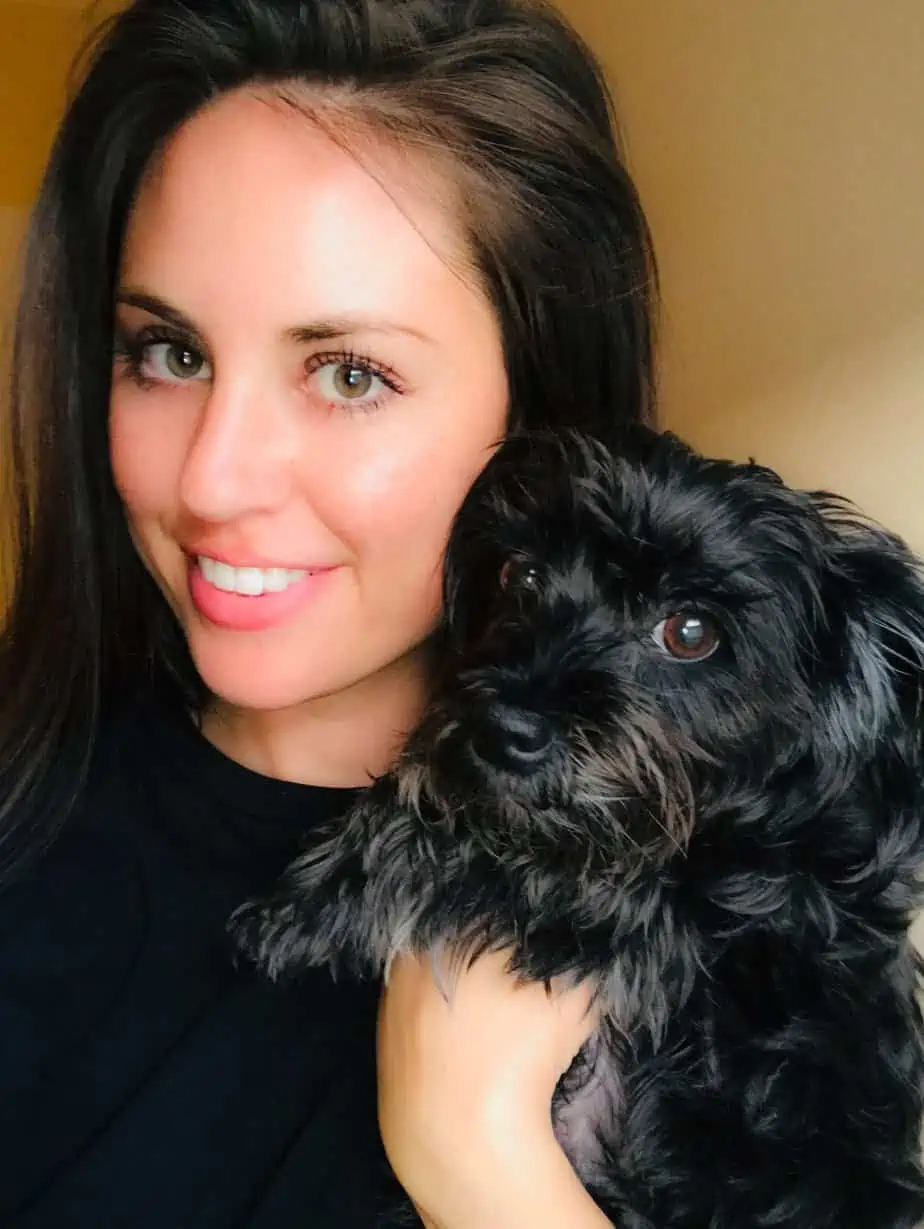
Madison Guthrie (also known as Sonny Mackenzi) is a pet care specialist and positive-reinforcement trainer who works most closely with anxious and reactive dogs. Born and raised in Littleton, Colorado, Madison developed a love for animals at an early age and spent most of her childhood outdoors rescuing stray pets and helping to rehabilitate injured wildlife. Along with animals, Madison also developed a love for writing and music. Over the past five years, she has worked to use her passions to help the pets and pet parents in her community build stronger bonds and live happier, healthier lives together. Currently, Madison lives in South Pasadena, California where she owns and operates Miss Madison LLC, a marketing company that focuses on helping privately owned veterinary establishments and pet care companies grow and thrive. She also works as a dog trainer at My Dog Spot, which is an award-winning pet care and training establishment in Pasadena, California.
